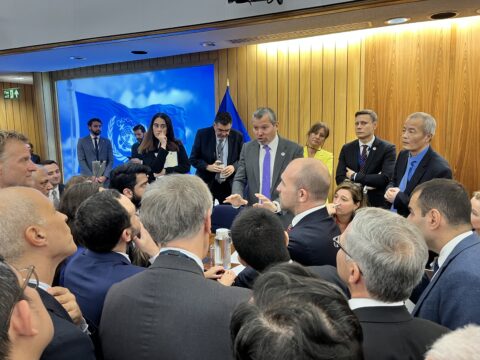Welcome to Carbon Brief’s DeBriefed.
An essential guide to the week’s key developments relating to climate change.
This week
Heat dome hits North America
100F: Temperatures in New York City reached 100F (38C) for the first time since 2013, as a heat dome “crushed” the eastern side of the US, reported the Associated Press. Baltimore, Philadelphia and Boston all also surpassed three-digit temperatures, it added.
CHIOS FIRES: More than 400 firefighters have been fighting wildfires on the Greek Island of Chios, with evacuation orders in place across the island, reported Reuters. Strong winds and 40C temperatures have made the fire “extremely difficult to control” amidst Greece’s first heatwave of the summer, added BBC News.
HEATWAVES: Japan is currently facing a two-week heatwave, driving up energy demand and keeping power prices high, reported Bloomberg. The Financial Times warned that temperatures could reach dangerous highs as “heat domes” continue to hit the US and Europe. The Daily Mail said the UK Health Security Agency had “activated the five-day alert amid concerns that there could be ‘a rise in deaths, particularly among those ages 65 and over or with health conditions’”.
Bonn climate talks close
BUDGET GROWTH: Reuters reported that more than 200 countries have agreed at the Bonn climate talks to increase the UN Framework Convention on Climate Change’s (UNFCCC) budget by 10% to €81.5m for 2026-27. (Carbon Brief has just published its in-depth summary of the Bonn intersessional.)
JUST TRANSITION: After talks stalled at COP29 last year, activists have welcomed progress on the just transition work programme (JTWP) in Bonn, reported Climate Home News. Campaigners hope the JTWP will lead to the creation of the Belém Action Mechanism at the upcoming COP30 in Brazil, helping to facilitate a just transition on the ground, the article added.
EYES ON COP30: As the two weeks of talks in Bonn came to an end, Bloomberg noted that “it’s still not clear what Brazil will need, or is aiming, to deliver” at COP30 in November. It added that, before the climate summit, most countries still need to submit new “nationally determined contributions”, detailing their plans to help meet the goals of the Paris Agreement, but, currently, less than 30 countries have done so.
Around the world
- DRILL, BABY, DRILL: US president Donald Trump has urged his government to “drill, baby, drill” as fears grew that the aftermath of attacks on Iran’s nuclear facilities could cause energy prices to spike, reported Reuters.
- GREENWASHING: EU countries have abandoned anti-greenwashing negotiations, after Italy withdrew its support for the bill, according to Politico.
- SOUTH AFRICA GRANT: South Africa’s national treasury has announced that the World Bank has granted it a $1.5bn loan to help it transition to a low-carbon economy, reported the Associated Press.
- MONEYPOINT: Ireland became Europe’s sixth country to end coal power with the closure of its last coal-fired plant at Moneypoint, according to the Irish Examiner.
- RECORD DEMAND: The Times reported on the Energy Institute’s annual statistical review, which showed global demand for every main type of energy hit a record high in 2024.
$525bn
Between 2000 and 2019, 55 climate-vulnerable economies lost approximately $525bn “because of climate change’s temperature and precipitation patterns”, according to a new report from the United Nations Development Programme.
Latest climate research
- Sea turtles will likely experience “substantial habitat redistributions” under future climate change scenarios, according to a new study in Science Advances.
- Warming of the tropical Indian Ocean can increase sea ice concentration in the Arctic during winter in the northern hemisphere, a study published in Climate Dynamics has found.
- According to a study published in npj Climate and Atmospheric Science, a 2C temperature increase over high-mountain Alpine regions would double the frequency of “extreme summer downpours”, compared to 1991-2020 levels.
(For more, see Carbon Brief’s in-depth daily summaries of the top climate news stories on Monday, Tuesday, Wednesday, Thursday and Friday.)
Captured

Emissions from the electricity sector in the UK have now fallen from being the largest emitter in the UK up until the mid-2010s, to the sixth-largest emitter, according to the Climate Change Committee’s latest progress report. As Carbon Brief’s chart above shows, this dramatic drop means that the electricity sector now produces fewer emissions than surface transport, industry, residential buildings, agriculture and – as of 2024 – aviation.
Spotlight
Gender clash at the climate talks
Negotiations in Bonn have laid bare divergent political and cultural stances as countries dispute gender terminology, reports Carbon Brief.
As technical discussions drew to a close in Bonn, Argentina inserted a footnote into one of the event’s many documents, defining “gender” as “two sexes, male and female”.
This seemingly innocuous move came at the end of a week-long terminology dispute, as nations debated a new “action plan” to centre gender equality in climate action.
Climate change often disproportionately harms women and can also have an outsized impact on other marginalised communities.
However, divergent political and cultural stances meant countries disagreed about the right ways to discuss these issues, ahead of a major decision later this year.
‘Global rollback’
UN climate talks are taking place amid a “global rollback” of rights for women and girls.
In some countries, notably the US and Argentina, this rollback has gone hand-in-hand with a rejection of so-called “gender ideology” and a reversal of trangender rights.
Right-wing populist leaders are also conflating environmental protection with efforts to protect women and marginalised groups.
For example, Argentine president Javier Milei has described “environmentalism”, “feminism” and “gender ideology” as “heads of the same beast” – namely, “wokeism”.
These views have manifested in unexpected places. Negotiations at a UN working group on pollution earlier this month saw the US insist that the output text stated: “Women are biologically female and men are biologically male.”
‘Strong divergence’
While the US was absent from Bonn, Argentina was a prominent voice in the gender sessions. This was despite the nation sending just one negotiator: Eliana Saissac.
Jennifer Bansard, who led the Earth Negotiations Bulletin (ENB) team that reported from within the Bonn talks, told Carbon Brief that Argentina took a “hard stance”:
“There’s definitely strong divergences on gender terminology and broader societal debates are affecting the talks.”

ENB’s reporting captures these disagreements. Argentina wanted to define “gender” based on a contentious 1998 statute of the international criminal court, referring to “two sexes, male and female”. Paraguay sought a similar definition.
Bansard noted that the divergence was “in both directions”, with some expressing more expansive views. Norway discussed “women and girls in all their diversity”, Canada referred to “gender-diverse people” and Iceland stated that it “[does] not support binary terms”.
Future plans
The talks also saw the Holy See – the governing arm of the Vatican City – make a rare intervention calling for a reference to “sex” rather than ”gender”. Saudi Arabia was among those flatly rejecting the notion of “gender diversity”.
These religiously conservative states have previously aligned in UN talks on gender. At COP29, they were among those reportedly blocking progress on the action plan.
In Bonn, they argued for cultural sensitivity and respect for nations’ differing laws. Claudia Rubio Giraldo, a lawyer who works with the Women and Gender Constituency, told Carbon Brief that she sympathised with this view:
“I think we all come here assuming that we are all on the same ground, understanding certain terminology…but there is a process of bridging that is necessary.”
Nevertheless, Giraldo championed an “intersectional” approach, backed by some nations, that benefits not only women, but also other marginalised groups.
NGOs also warned of parties attempting to roll back existing language on “gender mainstreaming” and “gender responsive” action.
Despite the disagreements, participants noted a constructive tone and agreed on an “informal note” to feed into future negotiations.
Yet, with the gender plan expected to be one of the more tangible outcomes from COP30, civil-society observers were cautious. Francesca Rhodes, a senior policy adviser at CARE International UK, told Carbon Brief:
“These negotiations are taking place in the wider context of a global rollback on rights and inclusive approaches to gender…Progress made must not be sidetracked by these efforts.”
Watch, read, listen
BESTING BIG OIL: The New Statesman had a feature on campaigner Sarah Finch and her victory in the supreme court in the UK last summer, which has “sunk billions of pounds worth of oil and gas projects”.
THIN ICE: Scientists at the University of Cambridge, including Prof Michael Meredith, discussed on The Naked Scientists podcast how the latest polar science is tracking climate change’s impact in Antarctica.
MAMDANI’S ‘GREEN ABUNDANCE’: The Jacobin examined how the focus of New York City mayor frontrunner Zohran Mamdani on lowering the cost of living can serve as a “blueprint” for embedding climate action in everyday life.
Coming up
- 7-25 July: 2nd Part of the 30th Annual Session of the International Seabed Authority, Kingston, Jamaica
- 11 July: IEA Oil Market Report publication
- 14-23 July: High-Level Political Forum on Sustainable Development 2025, UN Headquarters, New York
Pick of the jobs
- United Nations, national contractor for climate change mitigation | Salary: Unknown. Location: Baku, Azerbaijan.
- UNICEF, climate change negotiations consultant | Salary: Unknown. Location: Panama City, Panama.
- Chatham House, senior research fellow – energy transition and climate mitigation | Salary: £90,000. Location: London, England.
- Young European Greens, communications and campaigns intern | Salary: €1,500 per month. Location: Belgium.
DeBriefed is edited by Daisy Dunne. Please send any tips or feedback to debriefed@carbonbrief.org.
This is an online version of Carbon Brief’s weekly DeBriefed email newsletter. Subscribe for free here.
The post DeBriefed 27 June 2025: Heat domes; Bonn comes to a close; Gender clash in climate talks appeared first on Carbon Brief.
DeBriefed 27 June 2025: Heat domes; Bonn comes to a close; Gender clash in climate talks
Climate Change
Cheniere Energy Received $370 Million IRS Windfall for Using LNG as ‘Alternative’ Fuel
The country’s largest exporter of liquefied natural gas benefited from what critics say is a questionable IRS interpretation of tax credits.
Cheniere Energy, the largest producer and exporter of U.S. liquefied natural gas, received $370 million from the IRS in the first quarter of 2026, a payout that shipping experts, tax specialists and a U.S. senator say the company never should have received.
Cheniere Energy Received $370 Million IRS Windfall for Using LNG as ‘Alternative’ Fuel
Climate Change
DeBriefed 27 February 2026: Trump’s fossil-fuel talk | Modi-Lula rare-earth pact | Is there a UK ‘greenlash’?
Welcome to Carbon Brief’s DeBriefed.
An essential guide to the week’s key developments relating to climate change.
This week
Absolute State of the Union
‘DRILL, BABY’: US president Donald Trump “doubled down on his ‘drill, baby, drill’ agenda” in his State of the Union (SOTU) address, said the Los Angeles Times. He “tout[ed] his support of the fossil-fuel industry and renew[ed] his focus on electricity affordability”, reported the Financial Times. Trump also attacked the “green new scam”, noted Carbon Brief’s SOTU tracker.
COAL REPRIEVE: Earlier in the week, the Trump administration had watered down limits on mercury pollution from coal-fired power plants, reported the Financial Times. It remains “unclear” if this will be enough to prevent the decline of coal power, said Bloomberg, in the face of lower-cost gas and renewables. Reuters noted that US coal plants are “ageing”.
OIL STAY: The US Supreme Court agreed to hear arguments brought by the oil industry in a “major lawsuit”, reported the New York Times. The newspaper said the firms are attempting to head off dozens of other lawsuits at state level, relating to their role in global warming.
SHIP-SHILLING: The Trump administration is working to “kill” a global carbon levy on shipping “permanently”, reported Politico, after succeeding in delaying the measure late last year. The Guardian said US “bullying” could be “paying off”, after Panama signalled it was reversing its support for the levy in a proposal submitted to the UN shipping body.
Around the world
- RARE EARTHS: The governments of Brazil and India signed a deal on rare earths, said the Times of India, as well as agreeing to collaborate on renewable energy.
- HEAT ROLLBACK: German homes will be allowed to continue installing gas and oil heating, under watered-down government plans covered by Clean Energy Wire.
- BRAZIL FLOODS: At least 53 people died in floods in the state of Minas Gerais, after some areas saw 170mm of rain in a few hours, reported CNN Brasil.
- ITALY’S ATTACK: Italy is calling for the EU to “suspend” its emissions trading system (ETS) ahead of a review later this year, said Politico.
- COOKSTOVE CREDITS: The first-ever carbon credits under the Paris Agreement have been issued to a cookstove project in Myanmar, said Climate Home News.
- SAUDI SOLAR: Turkey has signed a “major” solar deal that will see Saudi firm ACWA building 2 gigawatts in the country, according to Agence France-Presse.
$467 billion
The profits made by five major oil firms since prices spiked following Russia’s invasion of Ukraine four years ago, according to a report by Global Witness covered by BusinessGreen.
Latest climate research
- Claims about the “fingerprint” of human-caused climate change, made in a recent US Department of Energy report, are “factually incorrect” | AGU Advances
- Large lakes in the Congo Basin are releasing carbon dioxide into the atmosphere from “immense ancient stores” | Nature Geoscience
- Shared Socioeconomic Pathways – scenarios used regularly in climate modelling – underrepresent “narratives explicitly centring on democratic principles such as participation, accountability and justice” | npj Climate Action
(For more, see Carbon Brief’s in-depth daily summaries of the top climate news stories on Monday, Tuesday, Wednesday, Thursday and Friday.)
Captured
The constituency of Richard Tice MP, the climate-sceptic deputy leader of Reform UK, is the second-largest recipient of flood defence spending in England, according to new Carbon Brief analysis. Overall, the funding is disproportionately targeted at coastal and urban areas, many of which have Conservative or Liberal Democrat MPs.
Spotlight
Is there really a UK ‘greenlash’?
This week, after a historic Green Party byelection win, Carbon Brief looks at whether there really is a “greenlash” against climate policy in the UK.
Over the past year, the UK’s political consensus on climate change has been shattered.
Yet despite a sharp turn against climate action among right-wing politicians and right-leaning media outlets, UK public support for climate action remains strong.
Prof Federica Genovese, who studies climate politics at the University of Oxford, told Carbon Brief:
“The current ‘war’ on green policy is mostly driven by media and political elites, not by the public.”
Indeed, there is still a greater than two-to-one majority among the UK public in favour of the country’s legally binding target to reach net-zero emissions by 2050, as shown below.

Steve Akehurst, director of public-opinion research initiative Persuasion UK, also noted the growing divide between the public and “elites”. He told Carbon Brief:
“The biggest movement is, without doubt, in media and elite opinion. There is a bit more polarisation and opposition [to climate action] among voters, but it’s typically no more than 20-25% and mostly confined within core Reform voters.”
Conservative gear shift
For decades, the UK had enjoyed strong, cross-party political support for climate action.
Lord Deben, the Conservative peer and former chair of the Climate Change Committee, told Carbon Brief that the UK’s landmark 2008 Climate Change Act had been born of this cross-party consensus, saying “all parties supported it”.
Since their landslide loss at the 2024 election, however, the Conservatives have turned against the UK’s target of net-zero emissions by 2050, which they legislated for in 2019.
Curiously, while opposition to net-zero has surged among Conservative MPs, there is majority support for the target among those that plan to vote for the party, as shown below.

Dr Adam Corner, advisor to the Climate Barometer initiative that tracks public opinion on climate change, told Carbon Brief that those who currently plan to vote Reform are the only segment who “tend to be more opposed to net-zero goals”. He said:
“Despite the rise in hostile media coverage and the collapse of the political consensus, we find that public support for the net-zero by 2050 target is plateauing – not plummeting.”
Reform, which rejects the scientific evidence on global warming and campaigns against net-zero, has been leading the polls for a year. (However, it was comfortably beaten by the Greens in yesterday’s Gorton and Denton byelection.)
Corner acknowledged that “some of the anti-net zero noise…[is] showing up in our data”, adding:
“We see rising concerns about the near-term costs of policies and an uptick in people [falsely] attributing high energy bills to climate initiatives.”
But Akehurst said that, rather than a big fall in public support, there had been a drop in the “salience” of climate action:
“So many other issues [are] competing for their attention.”
UK newspapers published more editorials opposing climate action than supporting it for the first time on record in 2025, according to Carbon Brief analysis.
Global ‘greenlash’?
All of this sits against a challenging global backdrop, in which US president Donald Trump has been repeating climate-sceptic talking points and rolling back related policy.
At the same time, prominent figures have been calling for a change in climate strategy, sold variously as a “reset”, a “pivot”, as “realism”, or as “pragmatism”.
Genovese said that “far-right leaders have succeeded in the past 10 years in capturing net-zero as a poster child of things they are ‘fighting against’”.
She added that “much of this is fodder for conservative media and this whole ecosystem is essentially driving what we call the ‘greenlash’”.
Corner said the “disconnect” between elite views and the wider public “can create problems” – for example, “MPs consistently underestimate support for renewables”. He added:
“There is clearly a risk that the public starts to disengage too, if not enough positive voices are countering the negative ones.”
Watch, read, listen
TRUMP’S ‘PETROSTATE’: The US is becoming a “petrostate” that will be “sicker and poorer”, wrote Financial Times associate editor Rana Forohaar.
RHETORIC VS REALITY: Despite a “political mood [that] has darkened”, there is “more green stuff being installed than ever”, said New York Times columnist David Wallace-Wells.
CHINA’S ‘REVOLUTION’: The BBC’s Climate Question podcast reported from China on the “green energy revolution” taking place in the country.
Coming up
- 2-6 March: UN Food and Agriculture Organization regional conference for Latin America and Caribbean, Brasília
- 3 March: UK spring statement
- 4-11 March: China’s “two sessions”
- 5 March: Nepal elections
Pick of the jobs
- The Guardian, senior reporter, climate justice | Salary: $123,000-$135,000. Location: New York or Washington DC
- China-Global South Project, non-resident fellow, climate change | Salary: Up to $1,000 a month. Location: Remote
- University of East Anglia, PhD in mobilising community-based climate action through co-designed sports and wellbeing interventions | Salary: Stipend (unknown amount). Location: Norwich, UK
- TABLE and the University of São Paulo, Brazil, postdoctoral researcher in food system narratives | Salary: Unknown. Location: Pirassununga, Brazil
DeBriefed is edited by Daisy Dunne. Please send any tips or feedback to debriefed@carbonbrief.org.
This is an online version of Carbon Brief’s weekly DeBriefed email newsletter. Subscribe for free here.
The post DeBriefed 27 February 2026: Trump’s fossil-fuel talk | Modi-Lula rare-earth pact | Is there a UK ‘greenlash’? appeared first on Carbon Brief.
Climate Change
Pacific nations want higher emissions charges if shipping talks reopen
Seven Pacific island nations say they will demand heftier levies on global shipping emissions if opponents of a green deal for the industry succeed in reopening negotiations on the stalled accord.
The United States and Saudi Arabia persuaded countries not to grant final approval to the International Maritime Organization’s Net-Zero Framework (NZF) in October and they are now leading a drive for changes to the deal.
In a joint submission seen by Climate Home News, the seven climate-vulnerable Pacific countries said the framework was already a “fragile compromise”, and vowed to push for a universal levy on all ship emissions, as well as higher fees . The deal currently stipulates that fees will be charged when a vessel’s emissions exceed a certain level.
“For many countries, the NZF represents the absolute limit of what they can accept,” said the unpublished submission by Fiji, Kiribati, Vanuatu, Nauru, Palau, Tuvalu and the Solomon Islands.
The countries said a universal levy and higher charges on shipping would raise more funds to enable a “just and equitable transition leaving no country behind”. They added, however, that “despite its many shortcomings”, the framework should be adopted later this year.
US allies want exemption for ‘transition fuels’
The previous attempt to adopt the framework failed after governments narrowly voted to postpone it by a year. Ahead of the vote, the US threatened governments and their officials with sanctions, tariffs and visa restrictions – and President Donald Trump called the framework a “Green New Scam Tax on Shipping”.
Since then, Liberia – an African nation with a major low-tax shipping registry headquartered in the US state of Virginia – has proposed a new measure under which, rather than staying fixed under the NZF, ships’ emissions intensity targets change depending on “demonstrated uptake” of both “low-carbon and zero-carbon fuels”.
The proposal places stringent conditions on what fuels are taken into consideration when setting these targets, stressing that the low- and zero-carbon fuels should be “scalable”, not cost more than 15% more than standard marine fuels and should be available at “sufficient ports worldwide”.
This proposal would not “penalise transitional fuels” like natural gas and biofuels, they said. In the last decade, the US has built a host of large liquefied natural gas (LNG) export terminals, which the Trump administration is lobbying other countries to purchase from.
The draft motion, seen by Climate Home News, was co-sponsored by US ally Argentina and also by Panama, a shipping hub whose canal the US has threatened to annex. Both countries voted with the US to postpone the last vote on adopting the framework.
The IMO’s Panamanian head Arsenio Dominguez told reporters in January that changes to the framework were now possible.
“It is clear from what happened last year that we need to look into the concerns that have been expressed [and] … make sure that they are somehow addressed within the framework,” he said.
Patchwork of levies
While the European Union pushed firmly for the framework’s adoption, two of its shipping-reliant member states – Greece and Cyprus – abstained in October’s vote.
After a meeting between the Greek shipping minister and Saudi Arabia’s energy minister in January, Greece said a “common position” united Greece, Saudi Arabia and the US on the framework.
If the NZF or a similar instrument is not adopted, the IMO has warned that there will be a patchwork of differing regional levies on pollution – like the EU’s emissions trading system for ships visiting its ports – which will be complicated and expensive to comply with.
This would mean that only countries with their own levies and with lots of ships visiting their ports would raise funds, making it harder for other nations to fund green investments in their ports, seafarers and shipping companies. In contrast, under the NZF, revenues would be disbursed by the IMO to all nations based on set criteria.
Anais Rios, shipping policy officer from green campaign group Seas At Risk, told Climate Home News the proposal by the Pacific nations for a levy on all shipping emissions – not just those above a certain threshold – was “the most credible way to meet the IMO’s climate goals”.
“With geopolitics reframing climate policy, asking the IMO to reopen the discussion on the universal levy is the only way to decarbonise shipping whilst bringing revenue to manage impacts fairly,” Rios said.
“It is […] far stronger than the Net-Zero Framework that is currently on offer.”
The post Pacific nations want higher emissions charges if shipping talks reopen appeared first on Climate Home News.
Pacific nations want higher emissions charges if shipping talks reopen
-
Greenhouse Gases7 months ago
Guest post: Why China is still building new coal – and when it might stop
-
Climate Change7 months ago
Guest post: Why China is still building new coal – and when it might stop
-

 Greenhouse Gases2 years ago
Greenhouse Gases2 years ago嘉宾来稿:满足中国增长的用电需求 光伏加储能“比新建煤电更实惠”
-
Climate Change2 years ago
Bill Discounting Climate Change in Florida’s Energy Policy Awaits DeSantis’ Approval
-
Climate Change2 years ago
Spanish-language misinformation on renewable energy spreads online, report shows
-

 Climate Change2 years ago
Climate Change2 years ago嘉宾来稿:满足中国增长的用电需求 光伏加储能“比新建煤电更实惠”
-
Climate Change Videos2 years ago
The toxic gas flares fuelling Nigeria’s climate change – BBC News
-

 Carbon Footprint2 years ago
Carbon Footprint2 years agoUS SEC’s Climate Disclosure Rules Spur Renewed Interest in Carbon Credits








